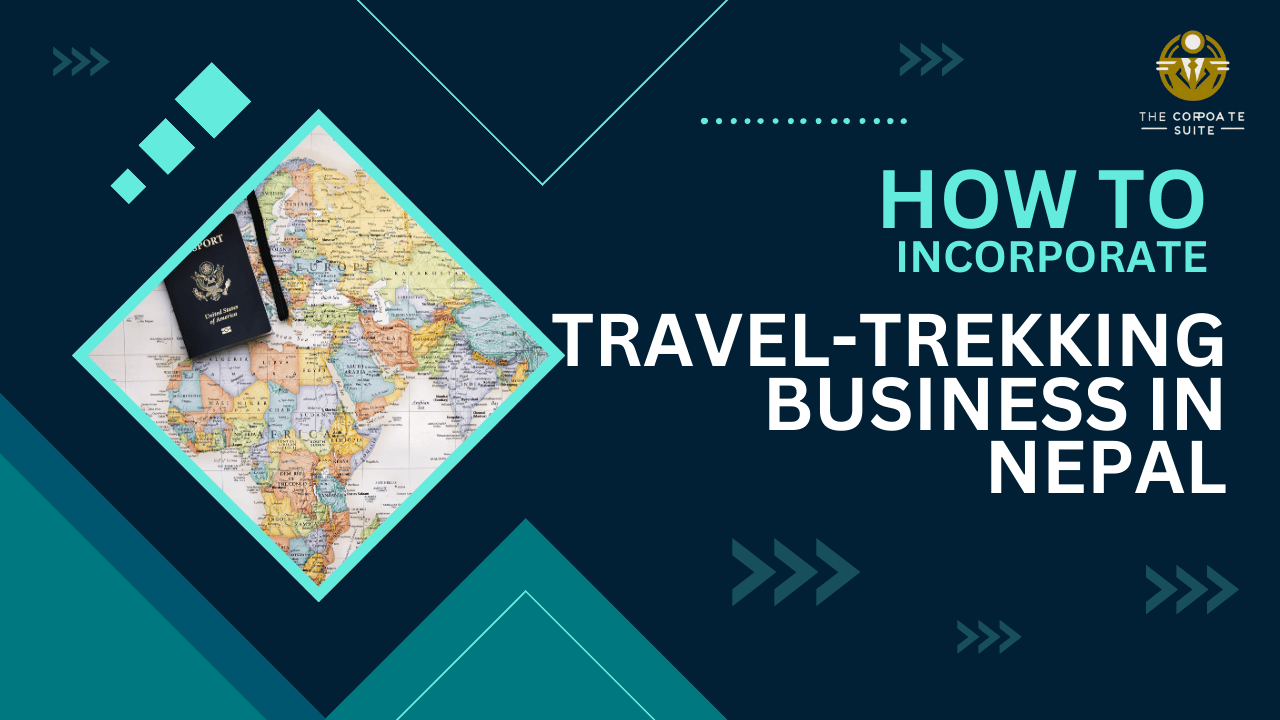
What are the steps to register a travel/trekking business in Nepal?
To register a travel/trekking business in Nepal, first, obtain a business name clearance from the Department of Industry. Next, prepare the necessary documents including company incorporation papers, memorandum of association, articles of association, and proof of office space. Submit these documents to the Department of Industry along with the application form and registration fee. Once approved, register with the Nepal Tourism Board (NTB) for tourism-related activities. Obtain licenses from relevant authorities such as the Department of Tourism and Department of Cottage and Small Industries. Finally, comply with tax registration and obtain necessary permits from local authorities and tourism associations.
Can foreigners register travel/trekking businesses in Nepal?
Yes, foreigners can register travel/trekking businesses in Nepal. Foreign investors are allowed to invest in tourism-related businesses under Nepal’s Foreign Investment and Technology Transfer Act. However, there are certain regulations and restrictions that must be followed. Foreign investors need to partner with a Nepali citizen or a Nepali company to establish a travel/trekking business. The partnership should adhere to the equity investment ratio as per the prevailing laws. Additionally, approval from the Nepal Rastra Bank might be required for foreign currency transactions related to the business operations.
Private Company Registration in Nepal
How much capital is required for a travel/trekking business in Nepal?
The capital required for a travel/trekking business in Nepal can vary based on the scale and scope of operations. There is no specific minimum capital requirement set by law for registering such businesses. However, it is advisable to have sufficient capital to cover initial setup costs, operational expenses, marketing, and contingency funds. Typically, the capital investment should be able to cover costs such as obtaining licenses and permits, office setup, hiring staff, purchasing equipment and vehicles, and marketing the business effectively to attract tourists and clients.
What are the regulatory requirements for registration of a travel/trekking business in Nepal?
The regulatory requirements for registering a travel/trekking business in Nepal involve several steps and compliance measures. Firstly, obtain a business registration certificate from the Department of Industry. Secondly, register with the Nepal Tourism Board (NTB) for tourism-related activities and obtain a trekking agency license from the Department of Tourism. Thirdly, ensure compliance with tax registration and obtain necessary permits from local authorities and tourism associations. Additionally, adhere to safety and environmental regulations set by the government and tourism authorities. It is crucial to maintain proper records, submit timely reports, and renew licenses and permits as required to operate legally and smoothly in the tourism sector in Nepal.
Are there specific locations for travel/trekking business registration in Nepal?
Travel and trekking businesses in Nepal can be registered in any location across the country where the business intends to operate. There are no specific restrictions on the location for registration, but it is practical to register in a place where tourism activities are prominent or where the business plans to have its main office. It is essential to ensure that the chosen location meets all regulatory requirements and has necessary infrastructure and access to tourism-related facilities.
Can a travel/trekking business offer shares to the public in Nepal?
No, a travel/trekking business in Nepal cannot offer shares to the public. Such businesses typically operate as private entities and are not listed on the stock exchange for public trading. Nepal’s Company Act and regulations governing private companies restrict them from issuing shares to the public. However, the business can raise funds through private investments or partnerships with Nepali citizens or companies, adhering to the foreign investment regulations if applicable.
How to draft the memorandum and articles for a travel/trekking business in Nepal?
Drafting the memorandum and articles for a travel/trekking business in Nepal involves outlining the company’s objectives, scope of activities related to tourism, management structure, shareholder rights, and operational procedures. The memorandum defines the company’s external activities and powers, while the articles detail internal governance and management rules. It is advisable to seek legal advice to ensure compliance with Nepal’s Company Act and regulations governing travel and tourism businesses. The documents must be signed by all initial shareholders and filed with the Department of Industry during the registration process.
What are the compliance requirements for travel/trekking businesses in Nepal?
Travel and trekking businesses in Nepal must comply with various regulatory requirements to operate legally. These include obtaining a business registration certificate from the Department of Industry, registering with the Nepal Tourism Board (NTB) for tourism-related activities, and obtaining a trekking agency license from the Department of Tourism. Compliance also involves tax registration with the Inland Revenue Department and obtaining necessary permits from local authorities and tourism associations. Additionally, businesses must adhere to safety standards, environmental regulations, and maintain proper records of their activities. Regular reporting and renewal of licenses and permits are necessary to ensure ongoing compliance with all applicable laws and regulations in the tourism sector of Nepal.
Can travel/trekking businesses operate internationally in Nepal?
Yes, travel and trekking businesses registered in Nepal can operate internationally. They can organize trekking expeditions, tours, and other travel-related activities outside Nepal’s borders. However, international operations must comply with the regulations of both Nepal and the countries where the business operates. It is essential for businesses to obtain necessary permits and licenses from relevant authorities in Nepal and adhere to international travel and tourism standards to ensure smooth operations abroad.
How to apply for licenses and permits for a travel/trekking business in Nepal?
To apply for licenses and permits for a travel/trekking business in Nepal, first, obtain a business registration certificate from the Department of Industry. Next, register with the Nepal Tourism Board (NTB) for tourism-related activities and apply for a trekking agency license from the Department of Tourism. Additionally, comply with tax registration requirements with the Inland Revenue Department and obtain necessary permits from local authorities and tourism associations. Submit required documents including company registration papers, proof of office space, and payment of applicable fees along with the application forms to respective departments and authorities.
What are the reporting requirements for travel/trekking businesses in Nepal?
Travel and trekking businesses in Nepal are required to fulfill reporting obligations to regulatory authorities. This includes submitting regular financial statements, tax returns, and operational reports to the Inland Revenue Department for tax compliance. Additionally, businesses must report to the Nepal Tourism Board (NTB) and the Department of Tourism regarding their activities, tourist arrivals, and any incidents or accidents during treks or tours. Compliance with reporting requirements ensures transparency in operations and adherence to regulatory standards in the tourism sector of Nepal.
Can a travel/trekking business merge or acquire other companies in Nepal?
Yes, a travel/trekking business in Nepal can merge with or acquire other companies, subject to compliance with Nepal’s Company Act and other relevant laws. Mergers and acquisitions involve legal processes such as due diligence, approval from shareholders, and clearance from regulatory authorities including the Department of Industry and Nepal Rastra Bank if foreign exchange is involved. The merged or acquired entity must comply with all licensing, permitting, and regulatory requirements applicable to travel and tourism businesses in Nepal.
Are there any incentives for travel/trekking business registration in Nepal?
Yes, there are incentives for registering travel/trekking businesses in Nepal. The government provides certain benefits and incentives to promote tourism-related activities. These may include tax holidays for a certain period, customs duty exemptions on import of tourism-related equipment and vehicles, and access to financial incentives and subsidies through programs aimed at promoting tourism infrastructure development. Additionally, there are special provisions for expedited processing of permits and licenses for registered tourism businesses, which can facilitate smoother operations and growth in the sector.
How does registering a travel/trekking business contribute to the economy in Nepal?
Registering a travel/trekking business contributes significantly to Nepal’s economy. It generates employment opportunities for locals, ranging from guides and porters to administrative staff and hospitality professionals. Tourism revenue directly supports local communities through accommodation, food, and souvenir sales. Indirectly, it stimulates sectors such as agriculture (for food supply), transportation (for logistics and travel), and handicrafts (for souvenirs). Moreover, tourism contributes to foreign exchange earnings, improving the country’s balance of payments. By promoting cultural exchange and environmental awareness, registered travel and trekking businesses also contribute to sustainable development goals.
What are the advantages of travel/trekking businesses in Nepal?
Travel and trekking businesses in Nepal offer several advantages. They capitalize on the country’s natural beauty, including the Himalayas and diverse landscapes, attracting tourists seeking adventure and cultural experiences. The sector creates employment opportunities for local communities, particularly in rural areas where tourism is a vital source of income. Moreover, these businesses promote cultural exchange by exposing visitors to Nepali traditions, cuisine, and lifestyles. Additionally, tourism revenue supports infrastructure development, such as roads and telecommunications, benefiting both locals and tourists. Overall, travel and trekking businesses play a crucial role in showcasing Nepal’s rich biodiversity and cultural heritage to the world.
Can travel/trekking businesses participate in government projects in Nepal?
Yes, travel and trekking businesses in Nepal can participate in government projects related to tourism and infrastructure development. The government often seeks partnerships with private sector entities, including tourism businesses, to implement projects such as trekking route maintenance, eco-tourism initiatives, and promotion of lesser-known tourist destinations. Businesses interested in participating in government projects must meet eligibility criteria and adhere to procurement procedures outlined by the concerned government agencies. Participating in such projects not only contributes to the development of tourism infrastructure but also enhances the business’s visibility and credibility within the industry.
How to protect customers’ interests in travel/trekking businesses in Nepal?
Protecting customers’ interests in travel/trekking businesses in Nepal involves several measures. Firstly, clearly communicate terms and conditions of services, including itinerary details, accommodation standards, and safety protocols. Provide accurate information about trekking routes, potential risks, and necessary equipment. Ensure guides and staff are trained in first aid and emergency procedures. Maintain transparent pricing policies and refund procedures. Obtain necessary permits and adhere to environmental and cultural preservation guidelines. Encourage feedback and promptly address customer concerns to enhance service quality and reputation.
Are there any restrictions on foreign investment in travel/trekking businesses in Nepal?
Yes, there are restrictions on foreign investment in travel/trekking businesses in Nepal. Foreign investors must partner with Nepali citizens or companies to establish such businesses. The partnership structure must comply with equity investment ratios as per Nepal’s Foreign Investment and Technology Transfer Act. Additionally, approval from the Nepal Rastra Bank may be required for foreign currency transactions related to the business operations. Foreign investment in trekking agencies and related tourism activities is encouraged but must adhere to regulatory requirements to ensure compliance with Nepali laws and regulations.
What role do travel/trekking businesses play in Nepal’s tourism industry?
Travel and trekking businesses play a crucial role in Nepal’s tourism industry by promoting and facilitating tourism activities across the country. They organize trekking expeditions, mountaineering ventures, cultural tours, and adventure activities that showcase Nepal’s natural beauty and cultural heritage to international and domestic tourists. These businesses generate employment opportunities, particularly in rural areas, and contribute to local economies through tourism-related expenditures. They also support infrastructure development by advocating for improved road access, telecommunications, and hospitality services in remote areas, thereby enhancing the overall tourism experience in Nepal.
Can travel/trekking businesses collaborate with other industries or sectors in Nepal?
Yes, travel and trekking businesses in Nepal can collaborate with other industries or sectors to enhance their offerings and promote sustainable tourism practices. Collaboration opportunities include partnerships with hospitality providers for accommodation services, transportation companies for logistical support, and local communities for cultural exchanges and eco-tourism initiatives. Businesses can also collaborate with educational institutions for training guides and staff in tourism management and environmental conservation. Such collaborations not only broaden the scope of services offered but also foster cross-sectoral cooperation aimed at enhancing the overall tourism experience and supporting inclusive growth in Nepal’s tourism industry.
Travel Trekking Business in Nepal
What licenses are needed for a trekking business?
Trekking company in Nepal need registration with the Company Registrar and Tourism Department.
Can foreigners own trekking businesses in Nepal?
Foreigners can invest in trekking businesses, subject to investment regulations.
What are the key regulations for trekking businesses?
Key regulations include tourism act, trekking guidelines, and environmental protection rules.
Is insurance mandatory for trekking businesses?
Yes, trekking businesses must provide insurance coverage for staff and clients.
What taxes apply to trekking businesses in Nepal?
Trekking businesses are subject to income tax, VAT, and tourism service fees.







